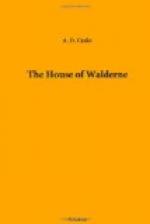“We must be off at once, brother, Hubert and I. The woods are not over safe after nightfall.”
“I must ask thee to spare me my son a while. I would fain make his further acquaintance.”
“Come back with us to Walderne, then. The lad would soon die of the gloom of a monastery.”
“I spent four years in one, and the earl found me alive at the end,” said Hubert.
“Nay, my brother, I may not leave the priory now.”
“But how long wilt thou keep the boy?”
“Only till tomorrow.”
“Well, I may tarry till tomorrow, but not at the monastery. My old crony, the De Warrenne up at the castle, will lodge me, and I will return for the lad after the Chapter Mass, at nine.”
Of all forms of architecture the Norman appears to the writer the most awe inspiring. Its massive round pillars, its bold, but simple arch, have an effect upon the mind more imposing and solemnising, if we may coin the word, than the more florid architecture of the decorated period, which may aptly be described as “Gothic run to seed.” Such a stern and simple structure was the earlier priory church of Lewes, in the days of which we write.
A little before midnight two forms entered the south transept by a little wicket door. There was a black darkness over the heavens that night, and a high wind moaned and shrieked about the upper turrets of the stately fane. Oh, how solemn was the inner aspect at that dread hour, lighted only by the seven lamps, which, typical of the Seven Spirits of God, burned in the choir, pendent from the roof.
One timorous glance Hubert gave into the dark recesses of the aisles and transept, into the dim space overhead, as if he almost expected to hear the flapping of ghostly pinions in the portentous gloom. A sense of mystery daunted his spirit as he followed his sire by the light of a feeble lamp, carried in the hand, amidst the tall columns which rose like tree trunks around, each shaft appearing to rise farther than the sight could penetrate, ere it gave birth to the arch from its summit. Dead crusaders lay around in stone, and strove with grim visage to draw the sword and smite the worshippers of Mohammed, as if in the very act they had been petrified by a new Gorgon’s head. The steps of the intruders seemed sacrilegious, breaking the solemn stillness of the night as the father led the son into the chapel of the patron saint of his order:
Who propped the Virgin in her faint,
The loved Apostle John.
There the horror-stricken Hubert heard the dismal tale which we have already related, and that his unhappy father believed himself yet visited each night by the ghost of the man he had slain. And also that it was fixed in his poor diseased brain that the apparition would not rest until the crusade, vowed by the Sieur de Fievrault, but cut short by his fall, should be made by proxy, and that the proxy must be one sans peur et sans reproche. And that this reparation made, the poor spirit, according to the belief of the age, released from purgatorial fires, might enter Paradise and reappear no more between the hours of midnight and cock crowing to trouble the living.




